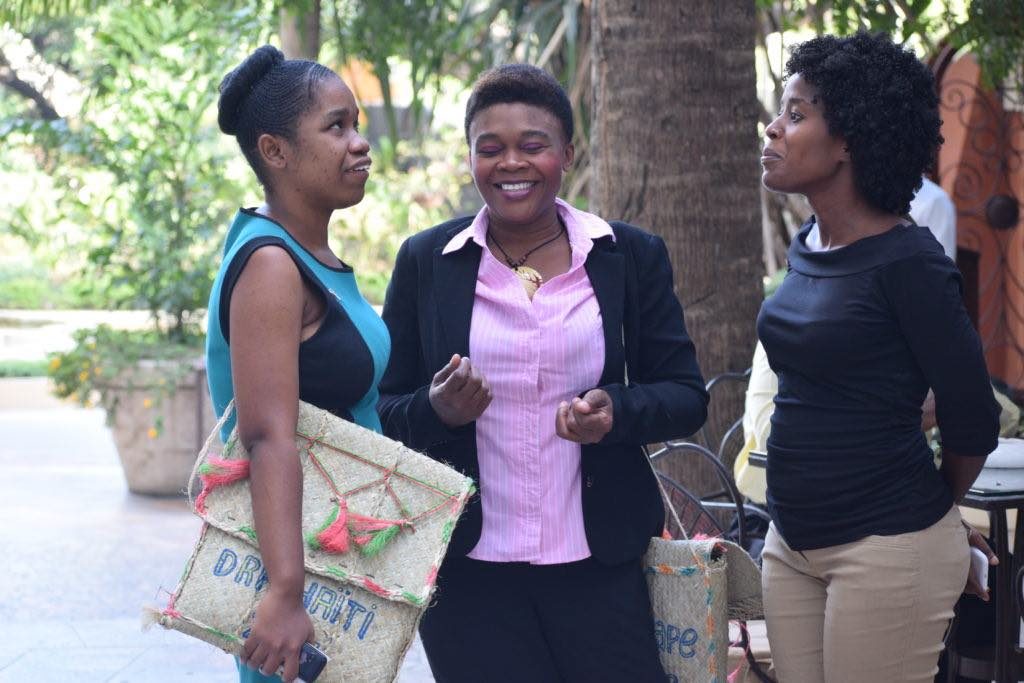Blog
Waiting for Our Rights

Michaelle Louis from AFAS, Soinette Desir from UFMORH and Cyndie Pierre Louis from AFAS
“Sorry. You are a rights holder on paper – and for the rest [you] have to wait.”
For the International Day of Persons with Disabilities, I would like to share an experience I had earlier this year.
During a DRF Grantee Convening in Haiti, I had the opportunity to converse with a diverse group of persons with disabilities representing eleven disabled persons’ organizations. (The Grantee Convening is a three-day meeting of DRF grantees where they can share experiences and learn from each other, which facilitates movement building.)
It was rewarding and inspiring. I spent three days listening to and learning from thirty leaders -women and men, agents of change – sharing their experiences as disability rights advocates fighting every day to demand what they are entitled to as human beings.
Imagine having to board a plane without using a jet bridge or loading stairs. Imagine going to a government office and finding no one able to understand what you need, because no one speaks sign language. Imagine being isolated in a special school just because you are a blind person. These are exactly the kinds of barriers that a person with disability has to deal with every day, in each and every single action they take in my country.
We also talked about progress in terms of empowerment of the movement, visibility of the great work they do, and laws that have been adopted or are in the process of being adopted because they are keeping the pressure on politicians high. I am very proud to be part of this.
I listened carefully to their stories. I was so captivated by the strength and determination of the grantees that I downplayed the real barriers. How could they not win this fight toward justice with such willpower? I guess my conclusion was skewed by the passion that drove me and the magic their words conveyed. I was mesmerized by so much energy and commitment in one room. I was invigorated.
The last day of this retreat, I offered one of the ladies a ride. She had polio as a child and walks with crutches. When we approached her house, she told me my car could not reach it and that she was going to take a motorbike-taxi. She had a purse and a carry-on suitcase. I parked the car and stopped the first taxi I saw, but when she got out of the car the driver looked at her and left without a word.
I really did not understand until the fourth one did the same thing.
“You better leave, or you will waste your time,” she said with a smile I will never forget. “Don’t worry, I will find a way home. They don’t want passengers like me. They are afraid of us. I am used to it,” she added.
That was a sad reality check – from a room where everything seemed possible to the reality of exclusion and stigmatization. I refused to leave her until she found a taxi that could be persuaded to take her home. I was furious. I looked at her. She never lost her smile or her joyful attitude.
Working with persons with disabilities like her is a rewarding experience for me. I get to learn a lesson of life every day.
Human rights cannot wait to be fulfilled. How can we ask someone with a disability to wait for fifteen years – and another fifteen years – to be able to exit from their home, go to school, find a job, and live their life like any other person?
Behind every single article of the CRPD, there are millions of human beings fighting every day for their basic human rights to be respected. Let us celebrate the progress we make, but let’s not be too proud of ourselves because we have obviously not done enough. Rights are indivisible and universal, which means one hundred percent of rights for one hundred percent of people – NOW. This cannot be postponed.
“No one should be left behind,” and that is the commitment made by our duty bearers.
 Jo-Ann Garnier is the Haiti Program Officer for the Disability Rights Fund. She works with the program team and serves as a liaison with Disabled Persons Organizations in Haiti. DRF has been making grants in Haiti since 2013. Jo-Ann brings over a decade of experience supporting Haitian civil society to promote the rights of children, including children with disabilities, and to provide technical support to civil society and the government on rights and inclusion of marginalized groups.
Jo-Ann Garnier is the Haiti Program Officer for the Disability Rights Fund. She works with the program team and serves as a liaison with Disabled Persons Organizations in Haiti. DRF has been making grants in Haiti since 2013. Jo-Ann brings over a decade of experience supporting Haitian civil society to promote the rights of children, including children with disabilities, and to provide technical support to civil society and the government on rights and inclusion of marginalized groups.